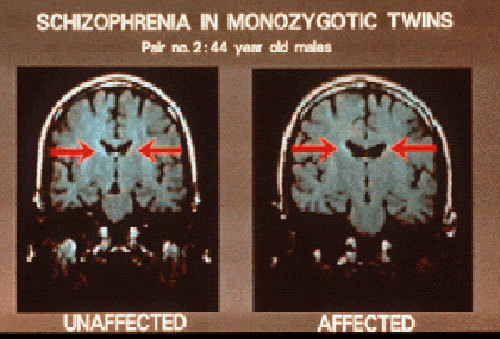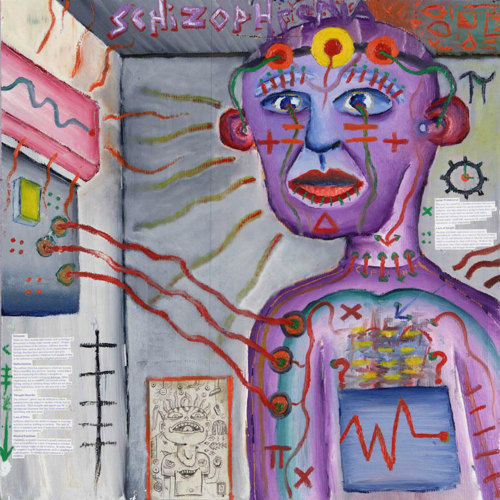
What role do genes play in schizophrenia, depression, and mental illness in general?
May 13, 2005

- Related Topics:
- Genetic conditions,
- Environmental influence,
- Complex traits,
- Neurodiversity
A curious adult from Maine asks:
“What role do genes play in schizophrenia, depression, and mental illness in general?”
Not an easy question to answer! Bottom line is, genes play an important but not decisive role in developing a psychiatric condition. There are changes in DNA that can lead to an increased chance of developing a psychiatric disorder.
Genes are not destiny, though. No single gene or mutation that I know of will cause you to have a 100% chance of developing a psychiatric condition. So the environment plays a critical role as well.
Let's look at schizophrenia as an example. Schizophrenia affects over 2 million Americans, around 1% of the population. And studies have shown that it clearly runs in families.
So if schizophrenia runs in the family, genes must be involved, right? Not necessarily.
Let's use an example to show how someone might be fooled by something running in the family. Imagine there is a family that lives near a toxic waste dump. The whole family has high rates of cancer.
Is it because of their genes? Probably not. The cancer is probably the toxic waste dump's fault, not the family's genes.
To try to figure out what role genes play, scientists sometimes often do a twin study. Twin studies compare identical twin pairs (who have the same set of genes) to fraternal twin pairs (who share as much of their genome as any regular siblings, 50%).
If something happens more often for both twins in an identical twin pair compared to twins in a fraternal twin pair, then the assumption is that genes are involved. Why? Because identical twins share the exact same DNA.
In twin studies looking at schizophrenia, scientists have shown that if one identical twin has schizophrenia, then there is a 30-50% chance that the other twin will have it as well1. If a fraternal twin has schizophrenia, then there is a ~15% chance that the other twin will have it too1. (This is the same percentage as any other siblings.)


So these results suggest that genes probably play a role. Of course, genes aren't the whole story. If they were, when one identical twin had schizophrenia, there would be a 100% chance that the other twin would have it as well.
But how might genes play a role in schizophrenia? To understand this, we need to understand a bit how the brain works and what goes wrong in mental disorders.
We collect lots of information about the world with our five senses. Too much. Special brain chemicals called neurotransmitters let us sort out and make sense of these signals. If something goes wrong with this system, you might develop a mental disorder.
These neurotransmitters don't exist in a vacuum. For them to have an effect, they interact with other proteins called ‘receptors.’ These receptors then cause all sorts of things to happen which then results in, for example, recognizing your mother's voice. Mental disorders can happen if something goes wrong with any of these parts.
Let's look at a common symptom of schizophrenia, hallucinations. Normally when we see something, the brain interprets what we see with these neurotransmitters. If the neurotransmitters were to go into action without the visual cue, you might "see" something that isn't there. Or if the receptor fired on its own (for no reason), you'd get the same result.

Great theory, but have any actual genes been found? One promising gene is the glutamate receptor gene (GRM3)2. One of the glutamate receptor's jobs is to respond to those neurotransmitters we talked about earlier. If it responds inappropriately, then you might have the beginnings of schizophrenia.
This genetic difference is almost certainly not the whole story. If it were, we could just track it in families and see who gets schizophrenia. But there are almost certainly many more genes involved and scientists are busily trying to find them.
And let's not forget the environment. Because identical twins didn't always both get schizophrenia, we know that the environment plays a role too. What the triggers are is still unknown. But whatever these triggers are, they play a critical role in mental disorders.
Other psychiatric conditions are similarly complicated. By figuring out which genes are involved, we can gain a better understanding of how our brains work. And hopefully come up with better and more specific medicines to treat various psychiatric conditions.

Author: Dr. Barry Starr
Barry served as The Tech Geneticist from 2002-2018. He founded Ask-a-Geneticist, answered thousands of questions submitted by people from all around the world, and oversaw and edited all articles published during his tenure. AAG is part of the Stanford at The Tech program, which brings Stanford scientists to The Tech to answer questions for this site, as well as to run science activities with visitors at The Tech Interactive in downtown San Jose.
 Skip Navigation
Skip Navigation
